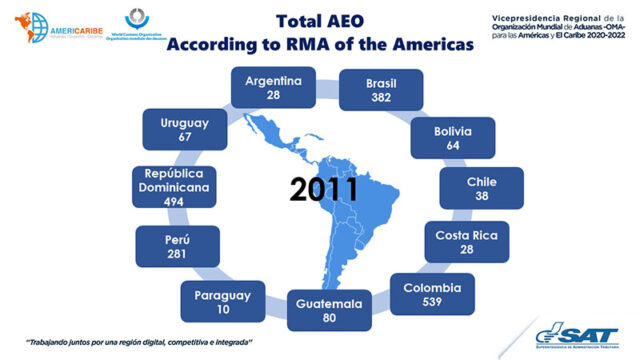- Customs administrations of 11 South American countries sign a multilateral Mutual Recognition Agreement (MRA) implementing AEO program
- The multilateral MRA signing is described as a new milestone for customs-to-customs relationship and further consolidates trust between Customs and the private sector
- The signatories were the customs administrations of Argentina, Bolivia, Brazil, Chile, Colombia, Costa Rica, Guatemala, Paraguay, Peru, Dominican Republic and Uruguay
Customs administrations of 11 South American countries have signed a multilateral Mutual Recognition Agreement (MRA) for the implementation of the Authorized Economic Operator (AEO) programs in the region, the World Customs Organization said in a statement.
The MRA was recently signed by the parties within the framework of a Coordinated Border Management event organized jointly by the Federal Revenue of Brazil and PROCOMEX in Sao Paulo, Brazil.
The signatories were the customs administrations of Argentina, Bolivia, Brazil, Chile, Colombia, Costa Rica, Guatemala, Paraguay, Peru, Dominican Republic and Uruguay.
The customs administrator of Guatemala, as regional vice-chairman of the WCO Americas/Caribbean region, said this achievement marks not only a new milestone for customs-to-customs relationship, as recommended under Pillar I of the WCO SAFE Framework of Standards.
He said the signing further consolidates trust between Customs and the private sector.
The vice-chairman also underscored the role of the regional private sector group for the Americas and the Caribbean in this process, as well as the support of the Global Alliance for Trade Facilitation during joint AEO validation visits.
He also thanked the signatory customs administrations as well as the WCO secretariat for providing technical support and assistance in implementing the instruments to improve customs performance.
Mutual recognition is a broad concept embodied within the WCO SAFE framework, whereby two countries enter into an agreement or arrangement to mutually recognize AEO authorizations that have been granted properly by one customs administration.
The SAFE Framework was adopted by WCO in June 2005 as a tool for global trade facilitation.
Countries in the Asia Pacific signed bilateral MRAs for AEOs shortly after the WCO’s flagship customs-business partnership program was introduced in 2007.
WCO members, however, did not sign the agreements immediately, as their acceptance of the AEOs had to be based on mutual recognition of the AEO authorizations.
Hong Kong and New Zealand, for example, have an MRA for AEOs on June 28, 2018, that became operational for sea cargo on February 22, 2019. That MRA has been extended to air cargo as well since September 13, 2021.
The MRA not only fosters closer cooperation between Hong Kong’s Customs and Excise Department and its counterpart in New Zealand in promoting a secure and efficient flow of goods in the international supply chain. It also further strengthens the trade competitiveness of local companies in New Zealand.
The current Asia Pacific signatories to MRAs for AEOs in addition to Hong Kong are China, India, South Korea, Singapore, Thailand, Malaysia, Japan, Australia, New Zealand, Israel, Canada, and Mexico









